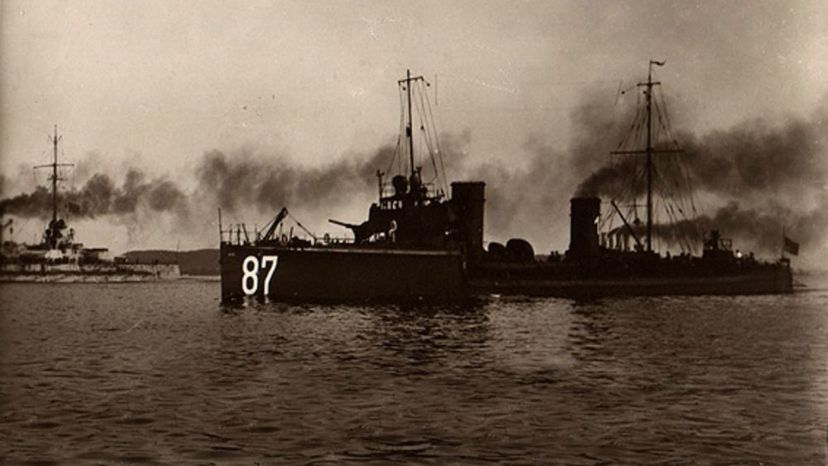
About This Quiz
World history, huh? There's just so much that has happened over the many millennia that this planet has existed for (and we're not even talking about the time dinosaurs roamed if you believe in the Big Bang thing, that is). We're talking about the time when man existed and was intelligent enough to start making records of his doings, inventions, and even crimes. Do you think you can answer these questions about the world's history?
We're going to ask you the creator of the printing press and when the first 'modern' Olympic games were held. We want to know what you know about the Cold War and if you know the names of the cities which suffered atomic bombings. We also want to know who created the Mona Lisa, which party the infamous Adolf Hitler ran and what battle a certain short man (also debatable) was defeated at.Â
If you can't answer these questions of this brief glimpse of our quiz, then we're not sure you'll be in the minority of people who can actually pass this test.Â
But if you want to try and if you call yourself a history buff, go ahead and give this quiz a whirl.Â
Nixon was the first and only U.S. president to resign. Only Bill Clinton and Andrew Johnson have been impeached.
With the help of Guevara, Castro led an armed revolution against then-Cuban president Fulgencio Batista. Castro's movement was called the 26th of July Movement.
The two cities were struck by the United States just three days apart. It led to Japan's unconditional surrender in World War II.
Advertisement
Thatcher was prime minister from 1979 to 1990. She was a member of the Conservative Party.
Lincoln was assassinated by Booth at Ford's Theatre in Washington, D.C., in 1865. He was succeeded by Andrew Johnson.
Hitler became Chancellor of Germany in 1933 and was later elected president in 1934. It was an unprecedented consolidation of power.
Advertisement
The Black Death came to Europe by sea when 12 ships of infected people arrived at a Sicilian port. The plague took an estimated 20 million lives in Europe.
Magna Carta means "Great Charter." It was a list of liberties given to the English people by King John, in the wake of a revolt.
Lewis and Clark led the expedition to explore the newly purchased territory. It about doubled the size of the country.
Advertisement
The British attempt to restrict U.S. trade and America's desire to expand its territory were a few of the causes of the War of 1812.
The Cold War started shortly after World War II and lasted until 1991. A major difference in beliefs and lack of trust between the two nations was the cause.
It is estimated that 17,000 people were tried and executed during the Reign of Terror, with countless others dying in prison.
Advertisement
The first modern Olympics were held in Athens, Greece. The Olympics date all the way back to 776 BC.
With his printing press, Gutenberg began his Bible project and printed approximately 200 Bibles. About 50 Gutenberg Bibles still exist today.
Russian cosmonaut Yuri Gagarin was the first man sent to space in 1961. He successfully orbited the planet in 89 minutes.
Advertisement
After the revolution, Napoleon made himself emperor in 1804. He conquered much of Europe in the 19th century.
The killing of Archduke Franz Ferdinand of Austria kicked off World War I. The conflict ended in 1918.
While Calvin helped carry on with the movement, it was started by Luther. The publication of Luther's 95 Theses is considered to be the start of the reformation.
Advertisement
The date is also known as The Ides of March. Julius Caesar's death led to the end of the Roman Republic.
It marked the end of the reign of Napoleon and France's dominance of Europe. He lived out his days in exile until his death in 1821.
Perhaps more well known as Evita, Maria Eva Duarte de Peron was the wife of Argentine president Juan Peron. She was first lady from 1946 until her death in 1952.
Advertisement
While the United States lost the race to space, the U.S. was successful in putting the first man on the moon in 1969.
The Allied Powers consisted of the United States, Great Britain and the Soviet Union, among others. The Axis Powers were Germany, Italy and Japan, among others.
The Renaissance followed the Middle Ages in Europe and was a cultural rebirth that took place from the 14th to the 17th century.
Advertisement
Hammurabi ruled the Babylonian Empire from 1792-50 B.C.E. As he conquered more territory, the Mesopotamian king decided a system of laws was needed.
The Fertile Crescent was an area containing moist and fertile land that stretches from the Mediterranean Sea to the Persian Gulf.
Known as "El Liberator," Bolivar was responsible for the liberation of Venezuela, Peru, Ecuador, Bolivia, and Colombia from Spanish rule.
Advertisement
Constantine himself converted to Christianity and was the first Roman Emperor to do so. He renamed the capital city Constantinople, which stood for over 1,000 years.
The Cuban Missile Crisis went by many names. It was arguably the closest the United States and Soviet Union came to a physical confrontation.
Invented by J. Presper Eckert and John Mauchly at the University of Pennsylvania, ENIAC used 18,000 vacuum tubes and weighed nearly 30 tons. Parts of the huge machine are on display in the Smithsonian.
Advertisement
On top of being a painter, da Vinci was an inventor and architect. He believed art was connected with science and nature.
On March 1st, 1896, Menelik II and his army were successful in defeating the Italians at the Battle of Adwa.
The Aztec Empire was located in central Mexico. Invaders led by Spanish conquistador Hernan Cortes overthrew the Aztecs in 1521.
Advertisement
Marx wrote "The Communist Manifesto" with the assistance of Engels. It was published in London by the Communist League.